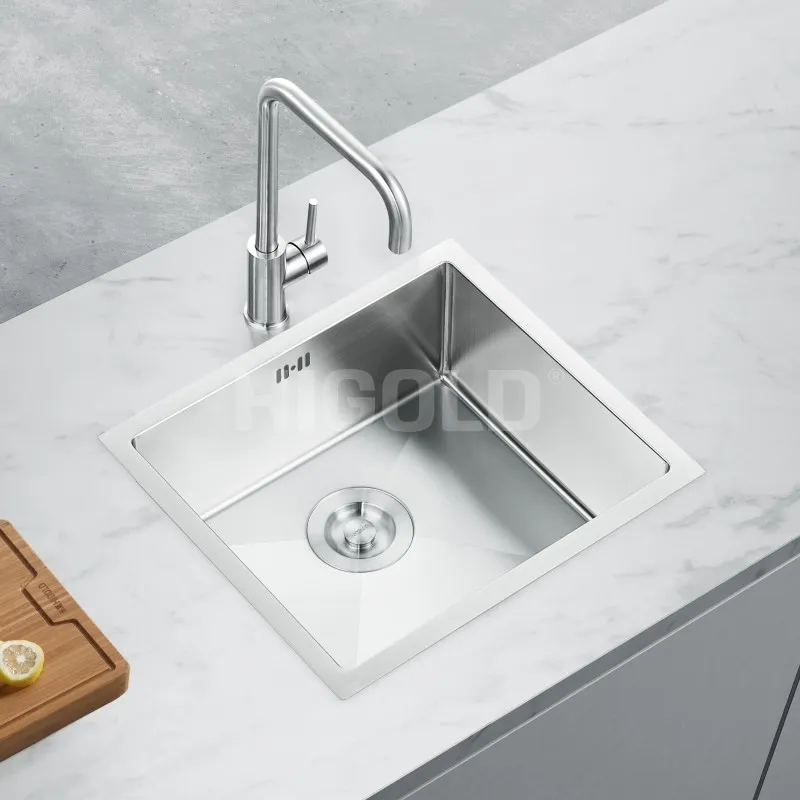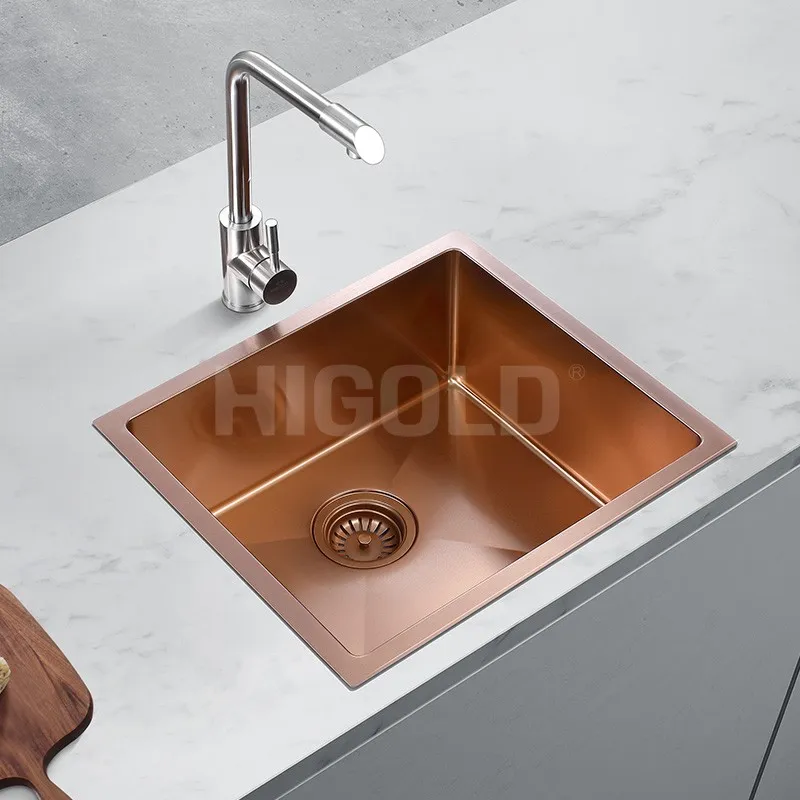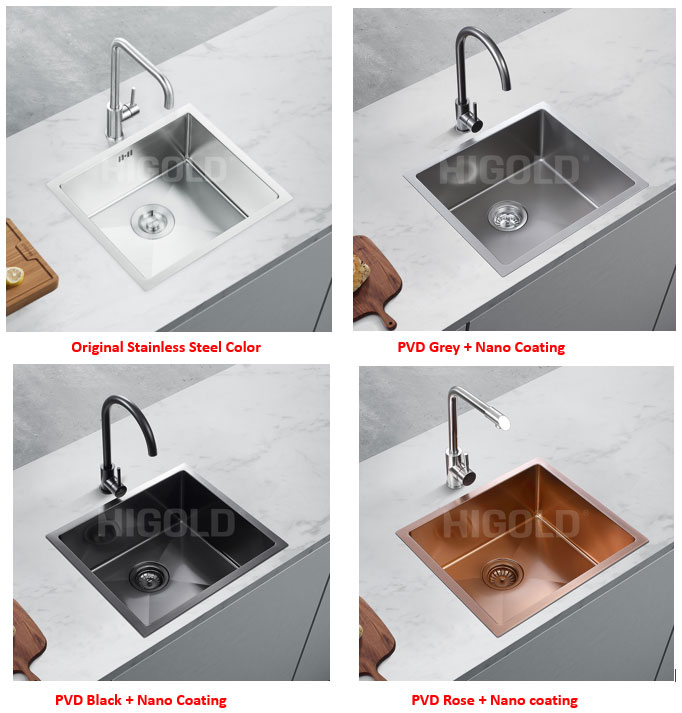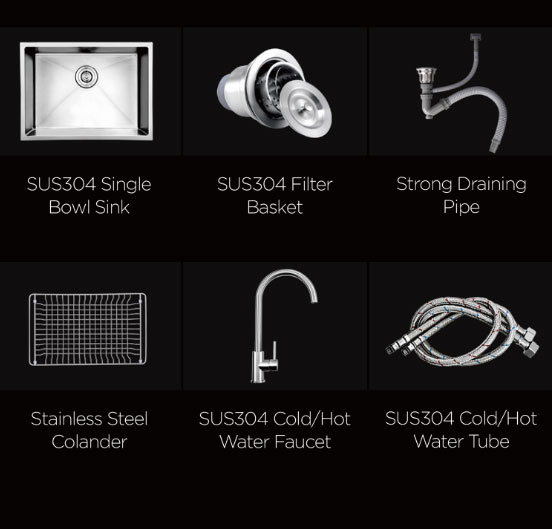Nowadays, people's requirements for kitchen functionality and aesthetics are constantly increasing. The choice of sink is no longer a simple purchase decision, but has become part of the overall kitchen design. The traditional kitchen stainless steel sink has always been the mainstream choice in the market because of its affordable price, durability and easy maintenance.
However, with the advancement of technology and changes in consumer demand, more and more new sink materials have entered the market. These materials have not only made innovations in aesthetics and functionality, but also made breakthroughs in durability and maintenance costs. So, what sink material is better than kitchen stainless steel sink? This article will comprehensively analyze several common alternative materials to help consumers make better choices.

What are the advantages and disadvantages of kitchen stainless steel sink?
Kitchen stainless steel sink occupies a pivotal position in kitchen sinks. Its universality and wide application make it the first choice for many people when decorating their kitchens. However, its advantages and limitations are equally obvious.
1.1 Advantages of kitchen stainless steel sink
● Durability: Kitchen stainless steel sinks are usually highly resistant to corrosion and can withstand long-term water erosion and daily use.
● Easy to clean: The surface of stainless steel is smooth and not easy to hide dirt, so it is relatively easy to clean.
● High temperature resistance: Stainless steel has strong high temperature resistance, and it is not easy to deform or damage even if a hot pot is directly placed in the sink.
● High cost performance: Compared with sinks made of other materials, the price of kitchen stainless steel sink is moderate, which is an economical choice.
1.2 Disadvantages of kitchen stainless steel sink
● Easy to scratch: Although stainless steel has strong durability, it is easy to be scratched by hard objects in daily use, resulting in obvious scratches on the surface of the sink.
● Noise problem: Kitchen stainless steel sink is prone to produce a loud water flow sound during use, especially under the impact of a large amount of water flow, the noise will be very obvious.
● Staining problem: Although stainless steel is not easy to absorb stains, some strong pigments such as ketchup, coffee, etc. may leave marks after long-term contact and are difficult to remove.
● Easy to leave water stains: Since there are often traces of water stains and fingerprints on the surface of stainless steel, it needs to be wiped frequently to maintain the gloss.
Although kitchen stainless steel sinks have certain advantages, considering their limitations, consumers are beginning to seek more efficient, durable and beautiful alternative materials.

Which sink materials are better than stainless steel?
As sink material technology develops, many new sink materials have gradually entered the market, which are better than kitchen stainless steel sinks in terms of scratch resistance, stain resistance, noise control and aesthetics. The following are several common materials that are better than kitchen stainless steel sinks:
2.1 Quartz sinks
Quartz sinks are usually made of a mixture of natural quartz sand and resin, and have excellent durability and beauty. The surface of quartz sinks is hard and smooth, giving people a sense of natural stone, which is widely loved by consumers.
● Scratch resistance: Quartz sinks have high hardness and strong scratch resistance. Quartz has a Mohs hardness of nearly 7, which is better than stainless steel in resisting scratches in daily use. For those families with children or who often handle hard objects, quartz sinks are a more durable choice.
● Anti-staining: Quartz sinks are very resistant to staining because the surface of quartz is dense and not easily contaminated by oil stains and pigments. Even dark foods such as ketchup and red wine are not easy to leave marks on the surface of quartz sinks.
● Aesthetics: Quartz sinks are usually more modern in appearance and have a wide range of color options. Whether it is glossy black and white, or more natural sand color, quartz sinks can add a sense of fashion to the kitchen.
However, the price of quartz sinks is usually higher than that of kitchen stainless steel sinks, and although its surface is scratch-resistant, it may still crack when subjected to great impact.
2.2 Granite sinks
Granite sinks are a composite sink made of natural granite and resin. Similar to quartz sinks, granite sinks are widely recognized for their durability and high-end appearance.
● Scratch resistance: Granite sinks have a higher hardness and excellent scratch resistance. Its wear resistance far exceeds that of kitchen stainless steel sinks, and it is not easy to scratch even with frequent use.
● Stain resistance: Granite sinks are very resistant to staining and are usually not easily stained by food or drinks. Even dark liquids such as red wine and coffee are not easy to penetrate the sink surface.
● High-end appearance: Granite sinks have become standard in high-end kitchens with their natural texture and luxurious feel. Its appearance is more elegant and can be seamlessly matched with modern or classic kitchen designs.
However, granite sinks are expensive, and after long-term use, if there are many scratches on the surface of the sink, it may not look as bright as when it was brand new. In addition, the installation of granite sinks requires higher technical requirements and the maintenance cost is relatively high.
2.3 Ceramic sinks
Ceramic sinks are a traditional sink material, usually made of high-temperature fired porcelain. It still has a place in many home kitchens because of its classic appearance and strong durability.
● Scratch resistance: The surface of ceramic sinks is relatively hard and can withstand most scratches and wear in daily use. Despite this, ceramic sinks are still relatively fragile, especially when hit by heavy objects, they are prone to cracks or cracks.
● Stain resistance: Ceramic sinks are more resistant to staining because their surface is usually smooth and dense. Even foods such as oil stains and ketchup are not easy to leave marks on the ceramic surface.
● Aesthetics: Ceramic sinks have a classic appearance and are suitable for those who pursue traditional or country-style kitchens. Their smooth surface also makes the kitchen look cleaner and tidier.
The disadvantage of ceramic sinks is that they are heavy, require special care when installing, and are fragile. Ceramic sinks may crack when they collide or are under excessive pressure, affecting their service life.
2.4 Artificial stone sinks
Artificial stone sinks are sink materials made of natural minerals and resins. It combines the firmness of natural stone and the plasticity of resin, and has excellent functionality and aesthetics.
● Scratch resistance: The surface of artificial stone sinks is relatively hard and has strong scratch resistance. During use, hard objects and sharp objects will cause relatively little damage to artificial stone sinks.
● Anti-staining: Artificial stone sinks have good anti-staining properties, are usually not easily stained by food or beverages, and have strong anti-fouling ability.
● Aesthetics: Artificial stone sinks are available in a variety of colors and textures, and can be customized according to the overall style of the kitchen to meet consumers' needs for aesthetics.
The disadvantage of artificial stone sinks is that after long-term use, scratches or surface wear may occur. Although these problems can be restored by surface polishing, they are relatively less durable than quartz or granite sinks.

How to choose a sink material that suits you?
When choosing a sink material, consumers should not only consider the durability and anti-staining properties of the sink, but also make decisions based on their kitchen style, budget, and maintenance needs. Here are some reference suggestions for choosing sink materials:
● Families with limited budgets: If the budget is relatively limited and the practicality of the sink is important, you can choose a kitchen stainless steel sink. Although it is easy to scratch, its price is relatively low and maintenance is simple, making it suitable for general household use.
● Families seeking high-end appearance and durability: If you have a generous budget and want a long-lasting sink with outstanding aesthetics, you can choose a quartz sink or a granite sink. These two materials are not only scratch-resistant and stain-resistant, but also have extremely high decorative value.
● Families focusing on traditional style: If the kitchen style tends to be traditional or country style, a ceramic sink is a good choice. Ceramic sinks are classic and beautiful, but you need to be aware of their fragility.
● Families with customized kitchen styles: For consumers who pursue personalization and customization, artificial stone sinks provide a variety of design options that can be tailored to the overall style of the kitchen.

Wholesale Kitchen Sinks and Faucets Direct from Higold
Higold Group is a leading manufacturer of kitchen stainless steel sinks and faucets, offering direct sales at wholesale prices. With our advanced manufacturing technologies and a production capacity of over 50,000 units per month, we can meet the demands of both small and large orders. We offer customization, quick delivery, and excellent customer service, ensuring that your business receives the best products at the best prices. Get in touch today for a detailed quote and explore our exciting promotions!


